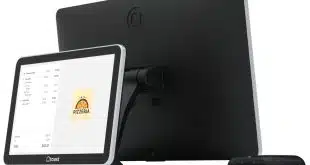PayPal Inc. will roll out mobile payments at the point of sale with as many as 20 retailers next year following a pilot set to start later in 2011, the chief executive of eBay Inc., PayPal’s parent company, said late on Wednesday.
Speaking to stock analysts as part of eBay’s quarterly earnings release, John Donahoe called processing for brick-and-mortar merchants an “incremental” opportunity for PayPal but gave no further details of the e-commerce processor’s plans. “There are going to be a lot of announcements,” Donahoe said, adding that PayPal is moving into the POS market at the request of merchants. “We’ve had merchants reach out to us quite aggressively to say they want us to bring PayPal to the point of sale,” he said, without naming any retail companies.
It remains unclear what technologies PayPal will rely on to process mobile payments for physical merchants. Companies like Starbucks Coffee Co. have introduced POS mobile payments using bar-code scanning. And eBay earlier this month announced it is payiing $240 million in cash to buy Zong Inc., a mobile-payments processor that specializes in digital goods and charges purchases to users’ wireless accounts. Some observers have speculated that PayPal could harness Zong’s carrier connections for POS payments, but Donahoe shed no light on that question. “We believe Zong will help us strengthen our leadership position in mobile payments and digital goods,” he said.
Questioned about near-field communication (NFC), an interactive technology that companies like Google Inc., MasterCard Inc., and Visa Inc. are starting to use to enable handset-based contactless payments, Donahoe said NFC is unlikely to gain ground any time soon because of merchant resistance. “I don’t think you’ll see large-scale adoption of NFC until there are standards,” Donahoe told the analysts. “[Merchants] aren’t going to allow anything [at the point of sale] that has friction.” He recounted a retailer’s reference to NFC as “not for commerce.”
Despite Donahoe's reservations about NFC for purchases, PayPal last week demonstrated a system for person-to-person payments that uses NFC to establish a link between users' phones.
Without naming competitors that have already moved into NFC, Donahoe played up what he sees as PayPal’s advantages for physical merchants, including the fact that the processor recently crossed the 100-million mark in active accounts. “We start with 100 million digital wallets,” Donahoe said. “We bring risk and fraud protection, and we’re equipped to bring that to PayPal Mobile and the point of sale.” He also cited the breadth of PayPal’s coverage of payments media. “We accept all tender types,” he said. “Merchants like that. [PayPal] will scale across all their stores and all their checkout lanes.”
PayPal Mobile is expected to process in excess of $3 billion in payments this year, a more than four-fold increase over its volume in 2010. In the conference call with analysts, Donahoe said the service is now being used by 8 million consumers.
In other developments, PayPal also expects to benefit from the Federal Reserve’s final rule implementing the Durbin Amendment to the Dodd Frank Act, eBay officials said during the call. The rule, which was released June 29 and caps debit card interchange at 21cents plus 0.05% for large issuers, will lower PayPal’s funding costs, said Bob Swan, eBay’s chief financial officer. He did not specify by how much, nor did he indicate what proportion of PayPal’s volume stems from debit cards. While some observers speculated before the final rule’s publication that the Fed might consider PayPal a card network for purposes of interchange regulation, Swan said that is no longer a concern. “We believe that the rules do not treat PayPal as a payment card network,” he said, adding the final rule’s impact on eBay will be “neutral to positive.”
Overall, PayPal racked up 432 million transactions in the second quarter, up 29% over the second quarter of 2010. Total dollar volume reached $28.7 billion, a 34% increase. Of that volume, some $18.9 billion, or nearly two-thirds, now stems from processing for e-commerce merchants rather than from eBay auctions. PayPal earned a margin of 63.6% on each transaction, little changed from prior quarters.





